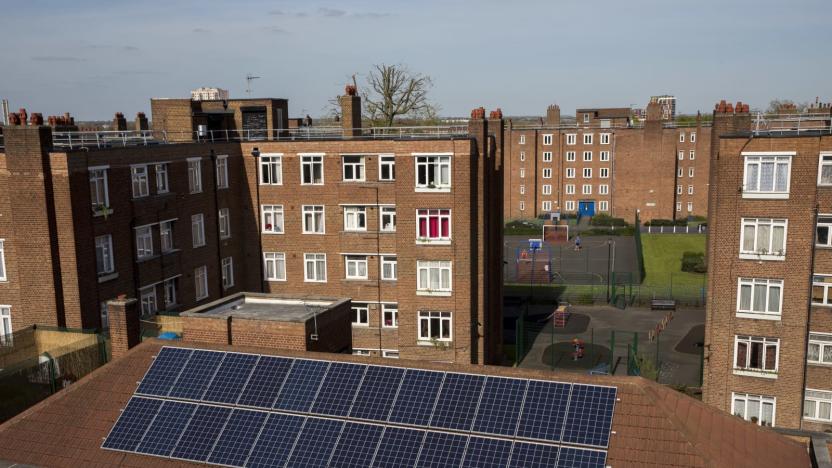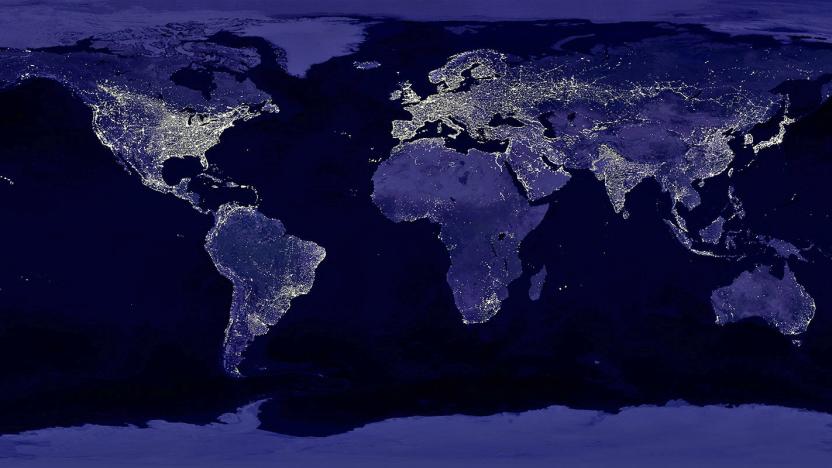poverty
Latest

FCC crackdown on cellphone subsidies leaves millions without service
The Ajit Pai-era FCC has spent much of its energy cracking down on claimed abuses of the Lifeline subsidy program, but this anti-fraud effort may be hurting low-income households more than it helps. The investigative news outlet Center for Public Integrity has used FCC data to determine that nationwide enrollment for cellphone subsidies has dropped by about 2.3 million people, or 21 percent, since 2017. The cuts have been particularly severe in places like the District of Columbia, where 49 percent of Lifeline users lost their subsidies between March 2018 and June 2019. Mississippi, Wyoming and Puerto Rico also lost a third or more of their enrollment in the same time frame.

Argentina residents use Facebook 'barter clubs' to make ends meet
Social networks can provide valuable services to the less fortunate, but sometimes they may be as much symptoms of problems as they are solutions. Reuters has reported that Argentina's poor are increasingly turning to Facebook-based "barter clubs" to trade goods in return for essentials they couldn't otherwise afford in a country grappling with high rates of inflation and unemployment. The groups had popped up in conventional forms in previous difficult years, but Facebook's rapid growth has made it the go-to option. This isn't a small-scale Craigslist-like exchange, we'd add -- there are frequently "hundreds" of people gathering at any given time.

Austin test uses blockchain to improve ID for the homeless
Many people take identification for granted, but it's a serious challenge if you're homeless. If you lose what's on your back, you might lose everything -- and recovering that ID is much harder when you have no fixed address or easy transportation to government offices. Austin might have a technological solution. The Texas city is piloting a system that uses blockchain identifiers to safeguard the IDs and vital records of homeless people in a way that's more accessible for service providers.

800,000 low-income UK homes to benefit from free solar panels
One of the biggest ever green energy schemes in the UK is set to provide clean energy for as many as 800,000 low-income homes over the next five years, renewable energy provider Solarplicity has revealed. As part of a £160 million investment from Netherlands-based Maas Capital (part of the ABN AMRO Bank), the company will provide 100,000 households with free solar panels over the next 18 months and hopes to reach its target within five years.

Satellite imagery can be used to predict regions of poverty
A new study in the journal Science shows how a combination of satellite imagery and machine learning algorithms can be used to predict poverty in regions of the world where data is otherwise unavailable. While it has long been accepted that nighttime lighting is a rough indicator of a region's wealth, that method of analysis is ineffective when dealing with regions of the world where there is often no power at all. This new method, described by lead author Neal Jean, actually uses nighttime images as well as publicly available daytime imagery and survey data to teach a computer system to estimate just how rich or poor an area is.

US to give poorer Americans $9 a month for broadband
The Federal Communications Commission has been talking a lot about reforming its Lifeline subsidy program to focus more on internet for poorer Americans than phone service, and now it's ready to show what those reforms should look like. The agency has published details of a proposal that, at its heart, would give low-income households $9.25 a month for broadband, whether it's fixed or mobile. The offer would cover both stand-alone internet access and bundles with voice service. Also, recipients wouldn't be stiffed on quality. You'd get service at least as good as what the "substantial majority" of Americans receive (currently 10Mbps downstream and 1Mbps up), and any cellphone voice plans have to include unlimited talk time.

Comcast's internet access program for low-income families will continue indefinitely
Comcast's Internet Essentials program was originally supposed to wind down this June, roughly three years after its launch in the wake of the NBC merger. However, the company has had a lot of success with the initiative -- enough so that it's extending the program indefinitely. Low-income American families can continue to sign up for basic, $10 per month internet access as long as they have children who qualify for free lunches. Comcast is also providing an extra level of coverage by funding 15 Internet Essentials Learning Zones, or partner networks that will help kids stay online at school, libraries and after-school activities. These latest moves won't completely bridge the gap between internet haves and have-nots, but they should be valuable complements to expanded school broadband efforts.

UK aims to improve access to technology, internet with £98 Linux PCs
Remember when the UK started distributing free laptops to poor schoolchildren in order to encourage them to get online? Well, a new, more frugal government is now in charge, and while the original scheme has been scrapped, today we're hearing of alternative plans to help economically disadvantaged people leap onto the worldwide surfer's web. The coalition government intends to offer £98 ($156) computers -- which include an LCD monitor, keyboard, mouse, warranty, and a dedicated helpline -- paired with subsidized £9 ($14) per month internet connections in its effort to show that the web doesn't have to seem (or be) unaffordable. The cheapest machines will be refurbished units running open-source Linux distros, meaning that if this Race Online 2012 trial turns out well, we could see a whole new group of Linux loyalists rising up. The more the merrier!

Forum post of the day: Born with a plastic spoon
Aside from players that are bitter because they missed out on Recruit-a-Friend benefits, is there anything wrong with this program. Kuahs of Kil'jaeden has encountered problems with raising enough cash to keep up with gear and ability upgrades. He has a level 70 character, but rerolled with his recruit on another server. He can't simply send money down from his main, and is sitting at level twenty-two with level twelve abilities. Many posters suggested sending down money from a main character, which isn't so helpful on a new server. Others made the usual suggestion of gathering skills for sale on the auction house. While this is a good suggestion, mining and herbalism will suffer the same problem of being outpaced by leveling. There is always the option of begging for gold in major cities, though I personally don't recommend this method.

Satiate intercontinental voracity with online vocabulary game
Ever feel you're wasting your time with games? Feel like you should be doing something to better yourself or the world around you instead of staring at a screen? Well, with Poverty.com's Free Rice game, you can do your part for personal and global fulfillment without ever stopping the gaming.The self-betterment in Free Rice comes from vocabulary identification questions that automatically adjust to your skills so they're challenging but not impossible. The world-improvement comes from the eponymous free rice, ten grains of which are donated through the UN's World Food Program and the site's advertisers for each right answer you provide. In the past month, over 856 million grains of rice have been donated, with the total rising exponentially day over day.We love the idea, and think this model has potential for all sorts of games. Every Halo headshot can net a donation to Amnesty international (sponsored by Mountain Dew). Every five star Guitar Hero performance could give money to Save the Music (sponsored by VH1, of course). Bill Gates could add few bucks to his foundation for every Achievement point earned. The possibilities are endless.[Via Gene. Thanks Michelle]

British children surveyed: "poor children don't have mobile phones"
Researchers in England recently polled children about their views on poverty, and in their eyes, what signs indicated that another child was poor. The children ages ranged from seven to sixteen, and surprisingly one in five kids reported that not having a mobile phone was a sign that other children were poor -- the highest response among all the indicators. The study was used to demonstrate that school-age children are paying close attention to the most obvious signs of wealth among their peers, while ignoring the more damaging indicators like being unable to pay for food or being without a safe place to go after school. We're not even sure a six year old should know what a cellphone is let alone make snap judgments about a person's wealth based on it, but if you think age six is too young for British kids to have mobile phones, another country has them beat.[Via textually.org and SMS Text News]

Thermoacoustics behind all-in-one cooker, fridge, and generator
Sure, building up a campfire in order to roast some eats in the wilderness could be fun for awhile, but for the reported "two billion people that use open fires as their primary cooking method," we're sure it loses its luster somewhere along the line. The University of Nottingham is hoping to change all that, however, by attempting to develop an all-in-one gizmo that acts as a "cooker, a fridge, and a generator," and relies on biomass fuels for energy. The £2 million ($3.96 million) SCORE (Stove for Cooking, Refrigeration and Electricity) project seeks to create a "wood-powered generator capable of both cooking and cooling food," and it will purportedly rely on thermoacoustics to cut down on pollutants, increase efficiency, and be more reliable to future consumers in Africa and Asia. No word just yet on when this newfangled kitchen appliance will be ready to ship, but a portable version would probably do quite well in the camping market.[Via CNET]

Ayiti: The Cost of Life
Ayiti: The Cost of Life is a simple, web-based strategy game built by NYC-based developers gameLab and students from Brooklyn's South Shore High School. The game's purpose is to teach about poverty in developing nations, but don't let the game's educational mission deter you from giving it a shot. It's not easy. In eight attempts to win with the "Money" strategy, we lost eight times (Cholera being the leading cause of death in the game). If you find a strategy that keeps your family from crapping themselves to death, do share, because the game's not at all easy. Then again, maybe the point is that you're not supposed to be able to win this one.


